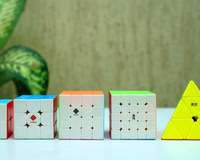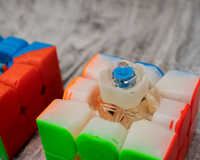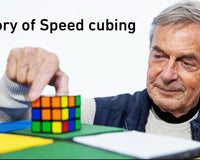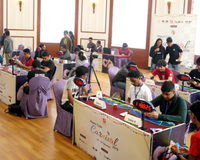Cubing, for most of us, is a hobby-turned-passion, and we as cubers know how tough it is to get better at it as you keep improving. So, it is safe to say that being the best at something requires you to sacrifice time and effort in other avenues of life. However, that doesn’t mean that you can’t work towards creating a balance between all of them.
My name is Akshaansh, and I have been cubing for the last 4 and a half years. In these years, my improvement in terms of cubing has been pretty good, with over 60 podiums in 20 competitions. However, the journey hasn’t been only about cubing. I am an avid sportsperson, playing tennis, basketball and frisbee on an everyday basis. I am also a musician and love playing the guitar, keyboard, bass guitar and drums.

But enough about me… Creating a balance between all these activities as well as cubing is based on one word only, according to me. “Priority”. Priority is a word that tells you how much time and effort you want to devote to a certain thing or activity at a certain time of the day/week/month/year. Priorities may change, even as quickly as in an hour, and there is nothing wrong with having different priorities at different times.
Related Read - 3 Best Smart Cubes You Should Buy Now - Arush Singh

A lot of people will tell you that you should only prioritize one thing at a time. A very well-known example of this is when we have exams, and our parents or elders tell us to only focus on studies for a good two weeks or so, and take away all of our “distractions”. This, in my opinion, is very unnecessary. I feel and know for a fact that it is possible to ace every single exam you write, while still doing all your hobbies and pursuing your passions too!
The way one would do this is simply by changing the amount of priority given to these things. So, for the time that you have your exams, you just need to put more effort into studies than usual, and less into say cubing and sports. This simply means reducing the amount of time spent cubing and playing, but NEVER cutting it down completely. A priority list makes this possible, with items on the top of the list getting more time and effort, and those toward the bottom getting less of the same.
Read More - Why Should You Cube? By Bhargav Narasimhan
Trust me, the best overall satisfaction and performance is achieved when you’re able to still do all the things you do on a daily basis, regardless of the day and occasion. It’s just a matter of distributing your priorities correctly depending on these ‘occasions’.
Now, take note that everything on your priority list is things you’re passionate about. So, doing them gives you immense joy, and that’s why you put them on the list. A great way to balance out the various things on this list is by treating the things on the bottom of the list as rewards for doing the things on the top! This idea of a ‘reward system’ of sorts is extremely effective, and since the things at the top of the priority list at a certain time are more important to complete, by doing the things at the bottom only when you finish the things at the top, you give yourself the drive to achieve things more quickly!
A great example of this is when you have to finish a project, an assignment, or are even just studying for a test. Since these things usually have deadlines, they move closer to the top of your priority list as you approach these deadlines. Now, since you’re still passionate about the things on the whole list, you now have to distribute your time and effort in such a way that you make more progress on the things at the top of the list, and reward yourself for this progress by spending slightly less time and effort on the things at the bottom. So, you can try setting a goal to finish say half your assignment (by spending say 3 hours) and then reward yourself with half an hour or 1 hour of cubing! This way, you even give your mind a break from the assignment, while doing the things you love, helping you a bit at improving at them too.
Notice how I always use the words ‘time’ and ‘effort’ together. This is because spending time isn’t the same as putting in effort. Someone might spend 3 hours studying and only finish like half a chapter (say), while another may spend just 30 minutes with full concentration, and finish nearly the whole chapter in just that time. So, you need to know when to put more effort in a given time, by increasing your concentration level, thus effectively saving time, since you’re spending less time doing more things. Use this to your advantage, by treating your relaxation breaks as high-time low-effort activities and your studies/instantaneous priorities as high-effort activities, with the aim of reducing the time you waste.

Okay, let’s step out of all that for a second and acknowledge that all this is a massive idealization of things, and, as humans, we can’t always be 100% efficient in managing our time. Plus, there’s no fun in being a literal machine, because we are social beings, and have many other needs that may not necessarily lie on our priority list. So, it’s natural to have to take breaks, and in fact healthy to take time off things that you love as well, just as a way of keeping the mind fresh, and returning to them with a rejuvenated mindset. This is another thing that is not given enough importance. Take breaks when you need them because burning out is worse than anything, since you won’t be able to do anything at all, regardless of where it is on your priority list, if you’re burned out.
Recommended Read - How Solving A Speedcube Can Help Ace Your Exams?
To conclude, I would like to summarize by saying that you should have this mental priority list when needed. If you’re ever feeling bored, just listen to your heart and mind, and think about the things you’re passionate about and want to improve at. Spend your time in the way you feel is best, and understand that this ‘priority list’ is very, very fluid and can change rapidly, and that’s perfectly fine and human. Make sure you’re finding some sort of happiness in whatever it is that you’re doing, either in the form of a reward system, or in the form of direct gratification. Last but not the least, remember that you’re not a machine and you are at liberty to take breaks that you deserve, in order to avoid burning out.
You can do so much more than you think.
Don’t settle. Never settle.

































